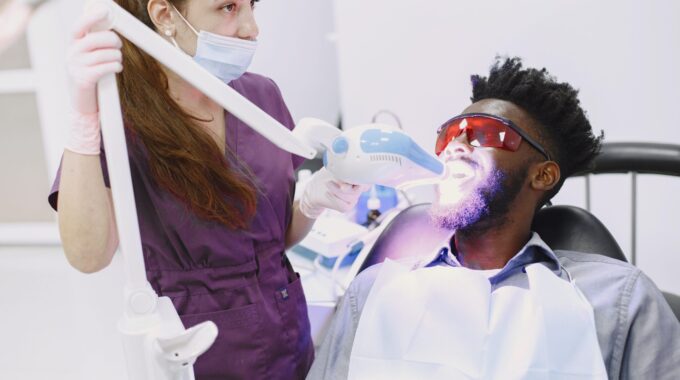
Tooth whitening: what you need to know
Tooth whitening is more popular than ever because everybody wants a nice, bright smile. But, with so many products available, it’s hard to know where to start.
When considering whitening, we should bear in mind that everyone’s teeth are unique and will respond to whitening differently. The success of whitening relies on choosing the correct whitening technique based upon a thorough assessment of the kind of staining…intrinsic or extrinsic.
Intrinsic (internal) stains are inside the enamel of your teeth and can be because of sickness as a child, antibiotic use, aging or dental trauma. These are much harder to remove as they are embedded deep within the tooth.
Extrinsic (external) stains are surface stains caused by environmental factors such as food, drink, and smoking.
So, how do I know which product is whitening option is right for me?
Essentially, whitening products can be split into 2 categories:
- Over-the-counter products- toothpaste/mouthwash/whitening strips
- Professional whitening- provided by a dental professional
Over-the-counter products:
Most over-the-counter products available in the UK, such as whitening toothpastes and mouthwashes, have limited effect on the colour of teeth as they can only contain 0.1% hydrogen peroxide (the active whitening ingredient).
Some products, like toothpastes containing charcoal or bicarbonate of soda, are abrasive. In the short-term they can be useful in removing surface stains from teeth but should no be used for long periods of time. Prolonged use of abrasive whitening products wears away the enamel, allowing the darker dentine layer below to shine through. This causes irreversible yellowing of the teeth. Remember, enamel is NOT made of living cells so once worn away, it cannot repair itself.
Professional whitening:
In the UK, any dentist registered with the General Dental Council can provide whitening. Registered dental therapist and hygienists can also carry out tooth whitening under the prescription of a dentist.
It is illegal for anyone other than a registered dental healthcare professional to provide tooth whitening.
Professional whitening is more effective than other methods as products used can contain up to 6% hydrogen peroxide. The hydrogen peroxide attacks the stains, breaking them down, and whitening the teeth.
You can choose from:
- Home whitening- Custom whitening trays will be made for you, and you will be instructed on use of whitening gels. The gels are placed in specific areas on the trays, you can then wear these either for an hour a day or overnight (depending on the product), usually for a period of 10-14 days initially. The gels, if refrigerated, last well and can be used again to “top-up” your whitening a few days at a time after 6-9 months.
- In-surgery whitening- Laser whitening, sometimes referred to as “Power whitening”, takes approximately 90 mins in the dental chair and involves a few rounds of whitening. The whitening product is brushed on to the teeth and a laser is used to activate it. The advantage of this method is he result is immediate, so you will leave your dentist with much brighter teeth than when you came…no having to wait 2 weeks for the result.
- Combination whitening- This is the most popular professional option. As the names suggests, it’s a combination of treatments i.e.: in-surgery and home whitening, which allows to the longest lasting result.
How long whitening lasts varies for everyone, from a few months to 3 years. Lifestyle factors such as smoking, coffee and wine drinking and highly coloured food intake will reduce the duration of whitening.
So, what else do you need to know about whitening?
- It won’t alter the colour of any fillings or dental work you have.
- It can cause temporary tooth sensitivity (use sensitive toothpaste 3 week before and throughout the whitening process).
- It can cause gum irritation (follow your dentists’ instructions carefully to avoid this).
- Permanent damage to tooth enamel can occur if teeth are whitened repeatedly or for longer than recommended by your dentist.
- It is illegal for tooth whitening to be done for those under 18 years of age, unless there are exceptional circumstances, which your dentist can discuss with you.
- It is not available under the NHS as it is a cosmetic treatment.
- Costs will vary from practice to practice so get some quotes and see which dentist you feel most comfortable with.
Now you know all about whitening, you can decide if it’s right for you and give you an idea of which option you may wish to consider.
Whether or not whitening is for you, remember the health and function of your teeth will always be the most important thing. There is beauty in the variety of life, and the same applies to teeth.
